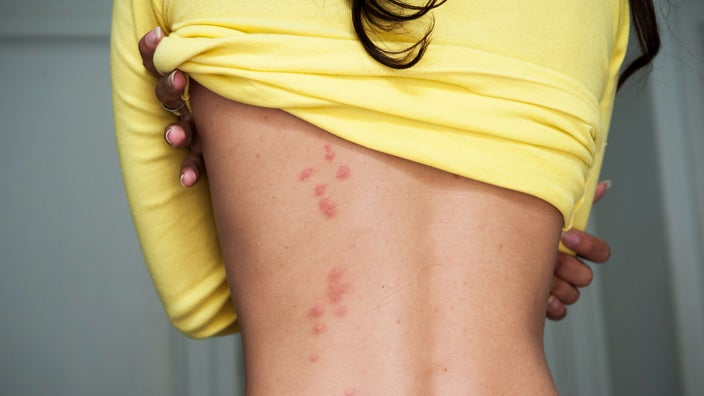Pest Control Provider Demystified: The Science Behind Removing Pests and Insects
Insect control solutions play an essential function in maintaining the health and wellness of our living and functioning atmospheres. Behind the relatively routine job of eliminating parasites exists a remarkable globe of scientific concepts and methodologies that drive the process of parasite management. From comprehending the complex habits patterns of bugs to utilizing sophisticated innovations for their obliteration, the world of insect control runs on a structure of knowledge that extends far beyond simply exterminating unwanted trespassers. As we explore the complex science behind parasite elimination, we discover a world where biology, chemistry, and innovation merge to deal with these durable adversaries.
Pest Habits Evaluation
Analyzing bug habits is crucial in establishing reliable bug control methods for both property and business setups. By understanding the habits and patterns of parasites, pest control professionals can implement targeted and efficient solutions to eliminate problems.
Furthermore, examining insect behavior aids in figuring out one of the most suitable methods of bug control. Various parasites may require different approaches, such as baiting, trapping, or chemical treatments. As an example, understanding that a specific sort of pest is largely active at evening can aid in scheduling treatments for optimum performance. Overall, an extensive evaluation of parasite behavior is essential for establishing customized pest administration strategies that are both eco-friendly and highly effective.
Integrated Insect Management Strategies
Integrated Pest Administration Strategies include detailed approaches that use a mix of precautionary steps, biological controls, and monitoring to effectively manage parasite populaces. Preventative measures aim to remove variables that attract parasites, such as food and water resources, by applying appropriate sanitation practices. This includes securing cracks and holes, repairing leakages, and keeping food in closed containers. Organic controls include presenting all-natural predators or parasites to manage pest populaces, minimizing the demand for chemical pesticides. As an example, releasing ladybugs to prey on aphids in a yard is an usual biological control method. Surveillance plays an important duty in Integrated Insect Administration by regularly inspecting and determining pest populations to establish the most proper control approaches. By making use of a mix of these techniques, parasite control services can decrease the ecological effect of bug monitoring while successfully reducing pest populations in a lasting manner.
Eco-Friendly Pest Control Solutions

With a focus on sustainability and environmental awareness, environment-friendly pest control remedies provide an all-natural and efficient alternative to standard chemical pesticides. These approaches focus on making use of safe ingredients derived from plants, minerals, or various other organic sources to combat insect invasions without causing damage to the atmosphere, people, or non-targeted this page varieties.
One preferred environment-friendly technique is biological bug control, which entails introducing all-natural killers, parasites, or virus to handle pest populaces. By using the power of nature's own checks and equilibriums, this technique can efficiently regulate pests without the need for hazardous chemicals. Additionally, herb pesticides acquired from plants like neem, pyrethrum, and garlic have actually revealed pledge in fending off or killing parasites while continuing to be secure for valuable insects and pets.
Furthermore, environmentally friendly pest control options often focus on preventive procedures such as sealing entry factors, getting rid of food and water resources, and maintaining appropriate sanitation to discourage insects from infesting structures. By integrating these sustainable techniques, pest control services can effectively eliminate pests while lessening ecological influence.
Role of Technology in Parasite Elimination
Modern innovations in innovation have revolutionized the field of parasite elimination, improving the effectiveness and effectiveness of parasite control services. The combination of technology in insect management has actually considerably improved the accuracy of parasite discovery, permitting targeted treatment strategies. One of the vital technical tools in insect control is making use of remote monitoring gadgets, such as electronic cameras and sensors, which assist in determining pest hotspots and tracking bug movements. ez commercial pest control service. These gadgets provide real-time information, making it possible for parasite control professionals to make enlightened decisions promptly.
Moreover, the growth of environment-friendly pesticides and baits that are much more targeted in termite ground treatment the direction of specific insects has been implemented with technical innovations. This targeted approach decreases the total use chemicals, lessening ecological influence while efficiently taking care of pest populaces. In addition, the usage of drones for aerial surveys and targeted pesticide application in hard-to-reach areas has streamlined parasite control rodents procedures.

Relevance of Regular Pest Inspections
Routine pest evaluations are important for maintaining a pest-free atmosphere and preventing problems from holding. By performing normal evaluations, property owners can identify bug troubles early, allowing for swift and targeted interventions to remove the bugs before they duplicate and spread. These evaluations provide a chance to recognize possible access factors where bugs can penetrate the facilities, enabling aggressive steps to seal off these gain access to points and prevent future problems.
In addition, routine parasite evaluations can assist secure the wellness and security of owners by making certain that the setting stays without disease-carrying parasites and irritants. Early discovery of insects like rats, cockroaches, or bed pests can prevent health dangers related to their presence, such as allergies, contamination of food and water resources, or the transmission of illness.
In addition to shielding human health, normal pest examinations are vital for maintaining the structural integrity of buildings - ez commercial pest control service. Specific parasites, such as termites, can trigger considerable damage to wood structures if left uncontrolled. Through routine evaluations, homeowner can identify termite invasions early and carry out procedures to stop costly structural fixings
Verdict
